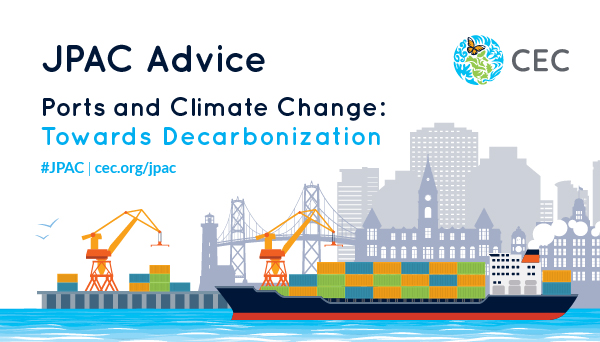JPAC Advice on the Role of Ports in Fighting Climate Change
The CEC Joint Public Advisory Committee (JPAC) recently submitted an Advice to the CEC Council following a Public Forum that took place in Halifax, Nova Scotia, Canada, on 1 December 2022.
The Public Forum brought together experts from port authorities, the maritime transportation industry, NGOs, academia and governments to discuss the role of ports in fighting climate change, including climate mitigation, green shipping corridors, zero-emission fuels and supporting infrastructure, and the environmental and social justice dimensions of ports. Attendance for the event exceeded 500 in-person and online participants from across North America and abroad.
JPAC Recommendations
Based on the discussions that took place during the Public Forum, and taking into consideration current global and regional initiatives and commitments, JPAC submitted the following recommendations to the Parties on potential areas for collaboration in North America:
- Create a Permanent CEC Initiative on Ports and Climate Change
JPAC recommends that the Council create a permanent Initiative on Ports and Climate Change and support projects related to the role of ports in responding to climate change and global ecological transition. This could include projects identifying and disseminating best practices on:
- the role of ports in climate mitigation,
- the electrification of port operations and associated freight activities,
- zero-emission fuels,
- operational and energy efficiency measures, and
- meaningful engagement with environmental justice and Indigenous communities in North America.
- Create a North American Ocean-Climate Action Plan
JPAC recommends that the Council support the creation of a North American Ocean-Climate Action Plan to put North America at advantage and support the development of sustainable ports.
- North American Agreement on the Use of Low and Zero-Emission Fuels
JPAC recommends that the governments of Canada, Mexico and the United States sign a North American Agreement on the Use of Low and Zero-Emission Fuels, to support the ecological transition and the Parties’ global climate commitments.
Click here to consult the complete Advice.
If you would like to learn more about JPAC and CEC initiatives, you can sign up for our newsletter and follow us on social media.

Joint Public Advisory Committee (JPAC) submits Advice to the CEC Council, following a public forum on the Role of Ports in Fighting Climate Change.
About the CEC
The Commission for Environmental Cooperation (CEC) was established in 1994 by the governments of Canada, Mexico and the United States through the North American Agreement on Environmental Cooperation, a parallel environmental agreement to NAFTA. As of 2020, the CEC is recognized and maintained by the Environmental Cooperation Agreement, in parallel with the new Free Trade Agreement of North America. The CEC brings together a wide range of stakeholders, including the general public, Indigenous people, youth, nongovernmental organizations, academia, and the business sector, to seek solutions to protect North America’s shared environment while supporting sustainable development for the benefit of present and future generations
The CEC is governed and funded equally by the Government of Canada through Environment and Climate Change Canada, the Government of the United States of Mexico through the Secretaría de Medio Ambiente y Recursos Naturales, and the Government of the United States of America through the Environmental Protection Agency.